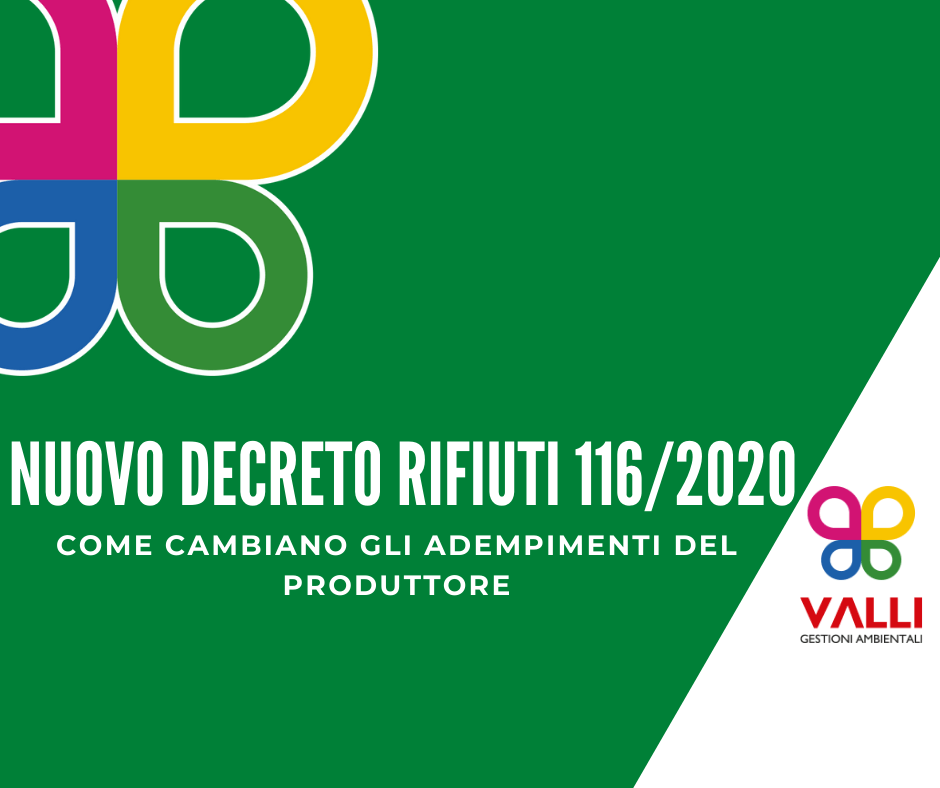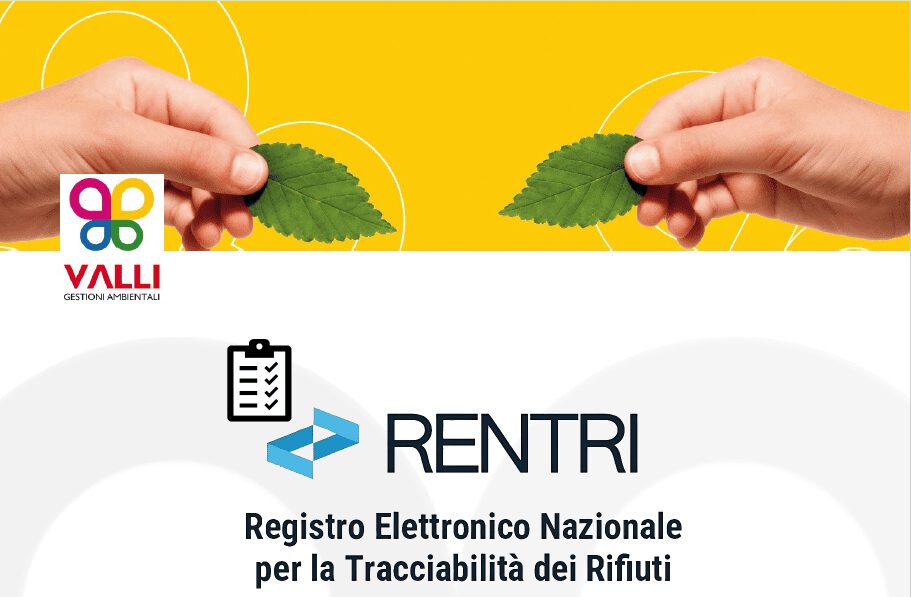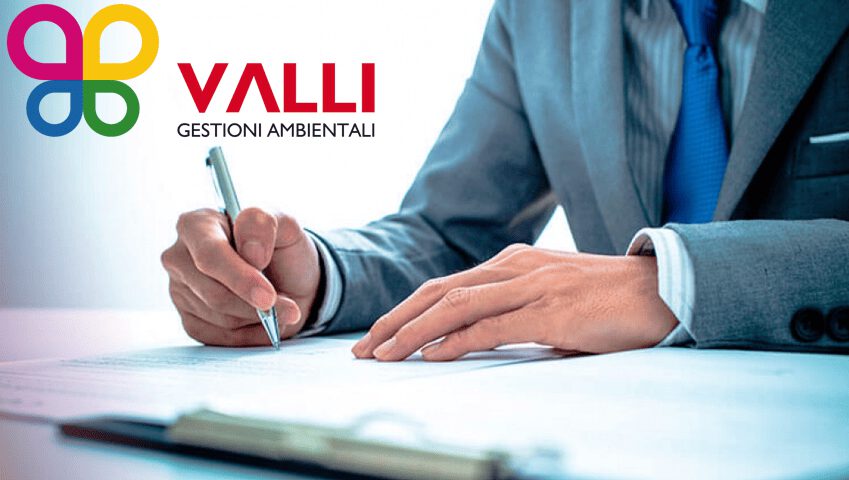Waste Decree no. 116/2020 has come into force: how the main obligations of the producer change.
September 26, 2020 represents an important date for the Italian environmental and industrial sector. In fact, Legislative Decree 116/2020, the so-called “Waste Decree”, has come into force, with which Italy implements two of the four EU directives (2018/851 and 2018/852), contained in the “Circular Economy Package“.
This decree substantially amends the fourth part of Legislative Decree 152/2006, the so-called Consolidated Environmental Act (TUA). All public and private entities that produce waste and operate in the field of waste, packaging and packaging waste management will have to comply with this new text.
The main innovations introduced in the field of waste management for producers are summarised below, highlighting the salient points.
Obligations of proper Waste Management by the Producer
Article 188 of Legislative Decree 152/2006 establishes that the producer is responsible for the correct management of waste, providing for its treatment directly, or by entrusting it to duly authorized parties (intermediary, trader, body or company that carries out waste treatment operations, person responsible for the collection or transport of public or private waste).
The delivery of waste to one of these parties does not constitute automatic exclusion of the producer’s liability with respect to actual recovery or disposal operations. In this regard, it is expected to understand how the jurisprudence will interpret the wording “automatic exclusion”.
Exception on Liability for the Disposal of Special and Non-Special Waste
Liability for the recovery or disposal of waste is excluded in the event that the producer has delivered the waste to persons authorised to carry out such activities and has received the Waste Identification Form (FIR) countersigned and dated by the recipient, within three months from the date of delivery of the waste to the transporter.
It is confirmed that the transmission of the fourth copy can be replaced by sending it by Certified Electronic Mail (PEC), the carrier remaining responsible for keeping the original document.
Furthermore, it should be noted that each operator is responsible for the information entered and signed in the part of the FIR that falls within its competence. In particular, the transporter is not responsible for what is indicated by the producer or holder of the waste and for any discrepancies between the description of the waste and its actual nature and consistency, except for discrepancies that can be found on the basis of common diligence.
In the case of delivery of waste to parties authorised to group D13, D14 reconditioning and D15 preliminary storage operations, the responsibility of producers for correct disposal is excluded provided that the producers, in addition to the fourth copy of the FIR, have received a certificate of disposal signed by the owner of the plant. In this regard, it is not clear why the certificate is related only to disposal (and not to recovery) and a specific model of it is not defined.
Waste disposal costs
Finally, it is clarified that the costs of waste management must be borne by the producer, as well as by the holders who succeed each other in various ways in the phases of the management cycle.
Waste Traceability System
Article 188-bis of Legislative Decree 152/2006 establishes the use of the National Electronic Register for Waste Traceability (RENTRI).
Subsequent decrees will define the tools integrated into the RENTRI, including the loading and unloading register and the transport identification form, in digital format.
While waiting for the new electronic register to be operational, the validity of the loading and unloading register and the FIR in use is confirmed.
For producers, the timing of the annotations on the loading and unloading registers remains unchanged, i.e. at least within ten working days from the production of the waste and its unloading.
An important novelty provides that the registers, integrated with the FIR, are kept for three years, instead of five, from the date of the last registration.
Paragraphs 4, 5, 6, 7, 8, 9 and 11 of art. 190 of Legislative Decree 152/2006, to which, for greater rigor, reference is made, report in detail the subjects exempted from the obligation to keep the loading and unloading register and the places where this document is kept. In particular, this communication would like to underline that companies and producing entities with NO more than ten employees are exempt from keeping the loading and unloading register for non-hazardous waste only.
The transport of special non-hazardous waste carried out by the producer on an occasional and occasional basis, i.e. no more than five times a year and without exceeding the daily quantity of 30 kg or 30 litres, is excluded from the FIR obligation.
As regards waste subject to cross-border shipments, the FIR is replaced by the documents already in use provided for by EC Regulation 1013/2006.
Finally, it should be noted that in the case of limited quantities of waste deriving from maintenance activities and small construction interventions, which do not justify the setting up of a warehouse where the activity is carried out, the transport from the place of actual production to the headquarters can be accompanied by the Transport Document (DDT), as an alternative to the FIR, although registration in the National Register of Environmental Managers for transport remains mandatory. It should be noted that the law does not better define either “limited quantities” or “small building interventions”.
Classification: municipal waste and special waste
Article 183 of Legislative Decree 152/2006, as amended by Legislative Decree 116/2020, extends the definition of municipal waste to certain unsorted and separately collected waste, i.e. that produced by the activities listed in Annex L-quinquies that are similar in nature and composition to the household waste indicated in Annex L-quarter.
This change is relevant only for the purposes of calculating the national recycling targets and will come into force from 1 January 2021.
In essence, the assimilation of special waste to municipal waste means that both urban and industrial waste can be considered in the percentage of waste that, according to a European directive, Italy will have to allocate for recycling, while it does not impact the entity that can manage the waste.
If you want to know more about the current regulations on special waste disposal and costs, read the complete and updated guide
Main Innovations of Legislative Decree 116/2020
With regard to the management of the aforementioned waste, Legislative Decree 116/2020 introduces the following changes:
- companies are not obliged to contact a public operator for the delivery of their waste and can choose the private sector (Article 198 of Legislative Decree 152/2006 paragraph 2-bis)
- companies that choose a private operator for the management of their waste to be sent for recovery are excluded from the payment of the tariff component related to the quantity of waste delivered (Article 238 of Legislative Decree 152/2006, paragraph 10)
- companies that choose a public operator will be bound to this operator for a period of not less than five years (Article 238 of Legislative Decree 152/2006 paragraph 10). Therefore, from the private sector it can be cancelled, from the public, on the other hand, before 5 years it is not allowed.
Finally, it should be noted that the attribution of the Waste Codes and hazardous characteristics must be carried out on the basis of the Guidelines drawn up, by 31 December 2020, by the National System for Environmental Protection and Research which will be approved by decree of the Ministry of the Environment.
For a more specific reading of the individual provisions, please refer to the text of Legislative Decree 116/2020 published in the Official Gazette (OJ General Series no. 226 of 11-09-2020).




